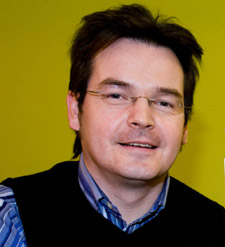Nurse lecturer in learning disabilities appointed to key NHS committee
Posted Thursday 24 June 2010

Jim Blair is the only expert on people with learning disabilities on the 12-strong Advisory Committee to NHS Evidence, a database that allows all health and social care staff to search for the latest research, guidelines and best practice information.
The advisory committee, which includes clinicians, research experts and lay people, vets and accredits applications for inclusion on the database, which was launched in April 2009. The committee's decisions are recommendations to NHS Evidence and the National Institute for Health and Clinical Excellence.
Mr Blair, who was the UK's first consultant nurse in learning disabilities in acute care when he was appointed in October 2008, said NHS Evidence was an excellent online resource. He said he used it in his work at St George's Healthcare Trust where he is involved in the admission, treatment and discharge of patients with learning disabilities."NHS Evidence is a one-stop shop for clinical evidence and best practice," Mr Blair said. "It helps me to raise awareness and shape practice when it comes to the treatment of patients with learning disabilities."
Mr Blair, who is also a senior lecturer in the Faculty of Health and Social Care Sciences run jointly by Kingston University and St George's, University of London, said he had become even more aware of the lack of high quality material in his specialist area since his appointment. "There's a dearth of hard research and clinical trials and there is also very little on the essential 'soft' information about patients' experiences which provides a benchmark as to whether we are getting the care right for people and their families. These are elements of care that I am addressing in my role in partnership with people who use the hospital, hospital staff as well as community clinical colleagues," Mr Blair added.
His work at St George's has included the development and implementation of an award-winning hospital passport scheme. The passport is a document filled in by people with learning disabilities and their carers which provides hospital staff with information about the patient's personality, abilities, likes and dislikes. It is particularly important for patients with communication difficulties.
'Learning Disability Champions' have been recruited by Mr Blair from among hospital staff to help him raise awareness of the needs of people with learning disabilities. He has also set up a committee made up of and led by people with learning disabilities to keep a check on whether the hospital is meeting their needs.
"My role has made a massive difference. I'm the only learning disabilities nurse in the hospital and I'm in the most senior clinical position a nurse can have; this allows me to embed systematic change in a way that improves patients' care and their experiences of being in hospital," Mr Blair concluded.